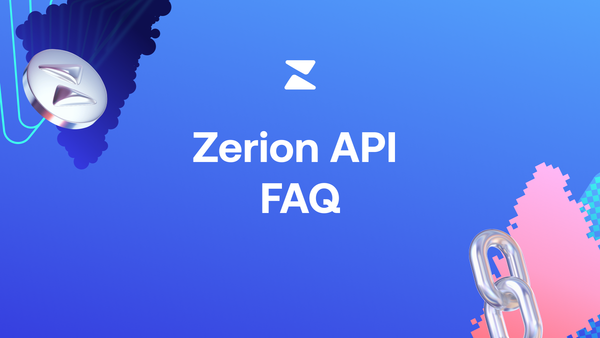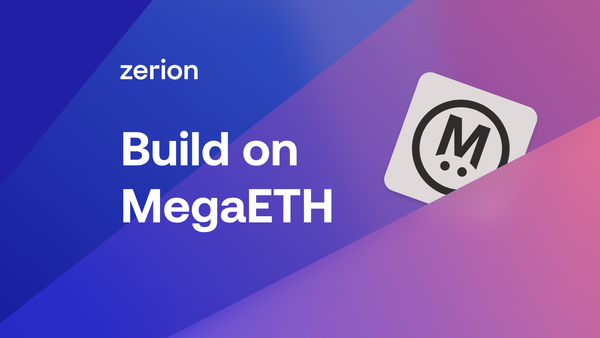How to Track Crypto Wallet Addresses: A Complete Guide
Learn how to track any crypto wallet address and see token balances, transactions, DeFi, and NFT holdings in real-time.

Tracking crypto wallet addresses is essential for anyone involved in cryptocurrency, from casual users to seasoned investors.
In this guide, we’ll explore the best ways to track crypto wallets on Ethereum and EVM chains (such as Base L2), from manual blockchain explorers to advanced portfolio tracking tools like Zerion. By the end, you'll know exactly how to monitor token balances, transactions, DeFi, and NFT holdings in real-time.
What Is Crypto Wallet Tracking?
Crypto wallet tracking refers to the process of monitoring the balances, transaction history, and activities of blockchain-based wallets.
Because blockchain transactions are public, anyone can track wallet addresses. However, doing so efficiently requires specialized tools, especially for multi-chain portfolios.
Why Is Wallet Tracking Important?
- Portfolio Management: Track asset performance across multiple wallets and blockchains.
- Security Monitoring: Detect unauthorized transactions or suspicious activity.
- Tax & Accounting: Get transaction history for accurate tax reporting.
- Whale Watching: Observes large holders' movements for market insights.
Best Ways to Track Crypto Wallets

1. Manual Tracking via Blockchain Explorers
Blockchain explorers like Etherscan, BscScan, and Polygonscan let you manually enter a wallet address and view its transaction history.
Pros:
- 100% free and accessible.
- Provides real-time transaction data.
Cons:
- Not user-friendly for beginners.
- Limited portfolio visualization.
- No DeFi positions.
2. Using Portfolio Trackers

Crypto wallet trackers aggregate wallet data across multiple networks, providing real-time insights into asset balances, transactions, and historical performance.
Popular Crypto Portfolio Trackers:
- Zerion – Multi-chain support, tracking transactions, DeFi positions, and NFTs in real-time.
- DeBank – Focuses on DeFi protocols.
- Zapper – Tracks DeFi portfolios and NFTs.
Why Zerion Stands Out:
- Supports over 40 EVM chains: Ethereum, Base, Polygon, and many Layer-1 and Layer-2 networks.
- One-click wallet connection for easy tracking.
- Tracks 800+ DeFi protocols and NFTs across most supported chains.
3. Exchange-Based Tracking
Most centralized exchanges, such as Coinbase, provide built-in portfolio tracking. While convenient, this method has limitations, as it only tracks assets held within the exchange and not self-custodial wallets.
Pros:
- Easy to use.
- Provides historical trading data.
Cons:
- Does not track external self-custodial wallets.
- Higher security risks due to reliance on centralized platforms.
4. Setting Up Alerts for Wallet Activities
Advanced tracking tools allow users to set up real-time notifications for specific wallet activities.
Tools for Setting Up Alerts:
- Zerion – Custom mobile notifications for tracked wallets.
- Arkham Intelligence – Identifies wallet movements for market trends.
- Nansen – Tracks smart money and whale movements.
How to Track Any Crypto Wallet Address
1. Tracking Your Own Wallet
Zerion makes it easy to track your personal crypto wallet. Simply:
- Connect your wallet (MetaMask, WalletConnect, Ledger, etc.).
- Instantly view your portfolio across multiple chains.
- Get real-time updates on balances, DeFi positions, and NFT holdings.
You can also install Zerion on mobile to track your wallets anywhere. And you can import your existing wallets to trade and make transactions on the go.
2. Tracking Other Wallets (Whales, Friends, or Scammers)
Since blockchain transactions are public, you can track any wallet address and copy trade them.
How to Track Other Wallets:
- Search the wallet address on Zerion to view balances and transactions,
- Add wallets to a watchlist for continuous tracking,
- Monitor whale movements to anticipate market trends.
It's best to track wallets on the go with the Zerion mobile app. That way, you'll get notifications whenever these wallets trade or do anything else.
Advanced Wallet Tracking Strategies
1. Multi-Chain and Multi-Asset Tracking
As crypto expands beyond Ethereum, tracking assets across multiple blockchains is crucial. Zerion supports networks like:
2. Tracking DeFi & NFT Portfolios
Keeping track of DeFi investments and NFTs can be complex. Zerion simplifies this by:
- Automatically fetching DeFi positions across lending platforms and liquidity pools.
- Displaying NFT collections with real-time valuations.
3. Tax and Accounting Benefits
Tracking wallet transactions is critical for tax reporting. Zerion Premium enables users to:
- Export transaction history in CSV format.
- Categorize transactions by type, chain, and other parameters.
Choosing the Best Crypto Wallet Tracker for Your Needs
Quick Comparison of Popular Portfolio Trackers
| Feature | Zerion | DeBank | Zapper | Arkham | Nansen |
|---|---|---|---|---|---|
| Multi-Chain Support | ✅ | ✅ | ✅ | ✅ | ✅ |
| DeFi Tracking | ✅ | ✅ | ✅ | ❌ | ✅ |
| NFT Tracking | ✅ | ✅ | ❌ | ❌ | ✅ |
| Real-Time Alerts | ✅ | ❌ | ❌ | ✅ | ✅ |
| Free to Use | ✅ | ✅ | ✅ | Limited | Limited |
Why Zerion Is the Best Choice
- All-in-One Tracking: Supports 40+ chains, DeFi, and NFTs.
- User-Friendly Interface: Easy to navigate and connect wallets.
- Real-Time Insights: Stay ahead with portfolio updates and alerts.
Conclusion
Tracking your crypto wallet is essential for managing your portfolio, securing your assets, and staying informed. While blockchain explorers and exchanges provide basic tracking, dedicated wallets with portfolio trackers like Zerion give you a better experience across different chains, DeFi, and NFTs.





